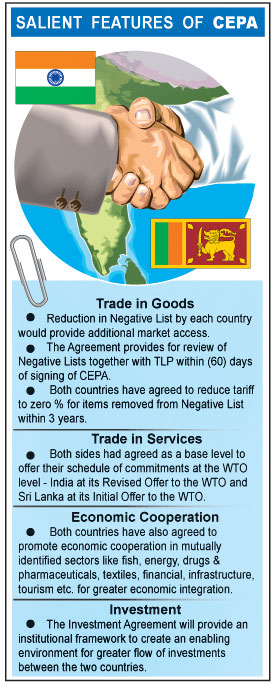CEPA signing likely to delay

The Nation (Colombo) | 30 May 2010
CEPA signing likely to delay
By Santhush Fernando and Tharindu Premathillake
Although Governments of India and Sri Lanka have shown keen interest in expediting their mutual trade pact, the Comprehensive Economic Partnership Agreement (CEPA) is likely to get delayed after local business leaders have expressed grave concerns over its impact on Sri Lankan economy.
Speaking to The Nation, vociferous business leader and Chairman of Mawbima Lanka Foundation, Ariyaseela Wickramanayake said that President Mahinda Rajapaksa had assured the business community that he would not agree to anything harmful to the country, when they visited him recently to hand over a petition of protest.
“We believe in the undertaking given by President Rajapaksa, that his government won’t sign anything that is detrimental to the country,” Wickramanayake said.
Speaking further about the negative aspects of the CEPA Wikramanayaka added, “When you take goods, we can import almost everything cheaper from India, from potatoes to onions to cars and motorbikes.
Then, our poor village farmers’ sons, who at least now have a job in the field, will have no livelihood whatsoever.”
“Out of all our neighbours, India is the closest to our hearts. We look up to that country which gave us Buddhism. India’s our big brother, we have nothing against India. All what we want is India to be fair in this. For my Company’s dairy and sugar industry operations, we bring both specialists and machines from India. They come here and train our people, so there’s both technology and knowledge transfer and more and more Sri Lankans get employment. However, if we employ Indians in our factories, what will become of our unemployed youth?” he questioned.
According to Wickramanayake, under the Indo-Lanka Free Trade Agreement, Sri Lanka exports scrap metal and waste paper, bringing in US$ 300mn (Rs.34.5bn) in foreign exchange, while India exports to Sri Lanka, highly value added goods ranging from machinery to motor bikes to cars worth a staggering US$ 3bn a year.
“It is true that our investors and businessmen have great difficulties when doing trade with India. In India at the national level, there might be strong support to get our businessmen and investors into their country, but when you go to the state level things get a lot more complicated, because the state governments put up a lot of red tape and hurdles against our investors in order to protect their industries.”
The Democratic National Alliance (DNA) is to request for a Parliamentary debate on CEPA when the House meets on June 8 as scheduled. DNA front liner Anura Kumara Dissanayake said he will make the request on that day as the CEPA imposes a ‘grave threat’ to local industries and entrepreneurs.
Meanwhile, former Trade, Commerce and Consumer Affairs Ministry Secretary Dr. R.M.K. Ratnayake who during his tenure had taken part in discussions on this matter said that there could be various difficulties when carrying out business at local levels in India even though it may look easy on national level.
Ratnayake added that unfortunately our negotiators are fairly weak compared to the Indian contingent.
“They are very strong and very knowledgeable and professional. Our ones are professional but not as strong as those from India. So, the pressure they put as well the pressure put from the political side is immense. Therefore, if we don’t want to go ahead with CEPA we will have a very difficult time working ourselves out of it. Because India clearly wants this implemented,” he said.
Ratnayaka also noted the importance of having a grip on immigration and emigration regulations in order to avoid unwanted issues.
“You can have a certain degree of control on who gets into the country. Migration between the countries is not part of trade. That is an internal matter of the country. You can’t have free transport. There are so many things you have to protect in your boarder. So, the government actually has the opportunity to limit the number of Indian professionals coming in.
“Unfortunately, we are not strongly negotiating on that. We need to tell the Indians, we will allow a number of people to get in, subject to the agreement that a specific number of our people get to go to India and work there. That way we will be able to protect our professionals while getting the benefits of the CEPA.
“Right now what happens is anyone can come into the country and at the airport they will grant you the visa. That system needs to change, we need to put up a couple of visa offices in India and get the Indians to obtain a visa from there before entering Sri Lanka. We need to have stronger regulations when it comes to granting visas,” he asserted.





